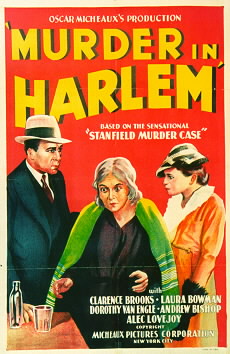| Murder in Harlem | |
|---|---|
 | |
| Directed by | Oscar Micheaux Clarence Williams (cabaret sequence)[ citation needed ] (uncredited) |
| Written by | Oscar Micheaux (novel The Story of Dorothy Stanfield) Oscar Micheaux (screenplay) Clarence Williams (cabaret sequence)[ citation needed ] (uncredited) |
| Produced by | Alice B. Russell (producer) Oscar Micheaux (producer)[ citation needed ] (uncredited) |
| Starring | See below |
| Cinematography | Charles Levine |
Release date |
|
Running time | 102 minutes |
| Country | United States |
| Language | English |
Murder in Harlem (also released as Lem Hawkins Confession and Brand of Cain) is a 1935 American race film written, produced and directed by Oscar Micheaux, who also appears in the film. It is a remake of his 1921 silent film The Gunsaulus Mystery .
Contents
Basing the works on the 1913 trial of Leo Frank for the murder of Mary Phagan, [1] Micheaux used the detective genre to introduce different voices and conflicting accounts by his characters. In July 2021, the film was shown in the Cannes Classics section at the 2021 Cannes Film Festival. [2]